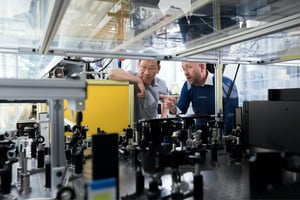Every great product starts with an idea. Maybe yours was sketched on a notepad, maybe it came from...
Technical Manufacturing's Return as a Path to Versatile, Purposeful Careers
After decades of technical manufacturing jobs taking a back seat to roles requiring a college education, jobs in high-tech manufacturing are quietly making a comeback. Several factors are driving the trend:
First, the pandemic drove many large manufacturers to rethink their supply chain and reshore the production and assembly of critical parts and assemblies. Many of these processes require highly technical labor and require a deep understanding of high-tech software such as Computer Aided Design (CAM) and Computer Aided Machining (CAM) programs.
Second, the vision of manufacturing plants being dark, dangerous labyrinthine hellscapes has been replaced with state-of-the-art facilities that could work as a backdrop for a science fiction thriller. Manufacturing in America today sits on the cutting edge of robotics, 3-D printing, and semi-autonomous machining that is all being run, monitored, and managed by a highly technical workforce.
Third, a career in technical manufacturing, like machining, offers a unique sense of satisfaction. Precision and skill are at the heart of machining, and seeing the intricately crafted parts you create come together in a final product is highly rewarding. Furthermore, the demand for skilled machinists remains consistently high in industries such as aerospace and automotive, ensuring job stability and opportunities for career advancement. Lastly, the expertise gained in mastering the art of machining contributes to the innovation and production of vital components, making it a fulfilling and impactful career choice in the realm of technical manufacturing.
Two more compelling reasons for the resurgence of technical manufacturing jobs are:
Fourth, technical manufacturing careers offer versatility and adaptability. In an era of rapidly evolving technology, the skills acquired in technical schools and on the job are highly transferable. Machinists, for example, can apply their precision and problem-solving abilities in various industries beyond aerospace and automotive, such as medical device manufacturing or renewable energy production. This adaptability ensures that individuals in technical manufacturing roles can navigate changes in the job market with confidence.
Fifth, the emphasis on innovation and sustainability in high-tech manufacturing is creating a sense of purpose in the workforce. Many technical manufacturing companies are at the forefront of developing eco-friendly materials and processes, contributing to a greener future. This sense of purpose, combined with competitive wages and job security, attracts individuals who want their work to have a positive impact on the world. As a result, technical manufacturing is not just a career choice but a means to drive positive change.
While overall, college graduates still earn slightly more than non-college graduates, the gap is closing fast, and college graduates with no discernable skills are finding high-paying opportunities far scarcer than in years past.
The math is clear. A certification from a technical school costs a fraction of a four-year degree, and students are often able to work in their chosen profession while going to school. Most graduate with little to no debt and move directly into jobs, making $50k-$70k from the start. Over a four-year period, a tech graduate may earn $200,000-$250,000 while gaining valuable work experience, while the college graduate is accumulating $30,000 - $150,000 in college debt and graduates with little to no practical work experience.
Large companies such as Boeing and government organizations such as NASA are investing millions of dollars nationwide at the high school level in an effort to re-ignite interest among young people in technical manufacturing. For example, one small high school in Helena, Montana, Capital High, has invested in a state-of-the-art machining program that has garnered national awards from NASA and several other prestigious organizations for their efforts to graduate students who are ready to work. Graduates of Capital High's machining program graduate with welding and Master CAM certifications, as well as gain practical work experience in partnership with dozens of manufacturing companies around the state. Many graduates go on to high-paying jobs in the trades.
In conclusion, the resurgence of high-tech manufacturing represents a compelling shift in the employment landscape, driven by factors such as supply chain reconsideration, advanced technology integration, and the evolving demand for skilled workers. This evolution not only showcases the transformation of manufacturing facilities into cutting-edge, futuristic workspaces but also underscores the unique satisfaction and stability that careers in technical manufacturing, like machining, can offer. The economic equation is clear – technical school certifications provide a cost-effective and debt-free path to lucrative job opportunities, outpacing the traditional four-year degree route in both earnings and practical experience. Furthermore, investments in technical education at the high school level, exemplified by initiatives like Capital High's machining program, are setting a promising trajectory for the future of manufacturing, preparing a new generation of skilled professionals ready to contribute to this dynamic industry. As the landscape continues to evolve, it's evident that the high-tech manufacturing comeback not only offers fulfilling careers but also paves the way for a more equitable and prosperous workforce.



